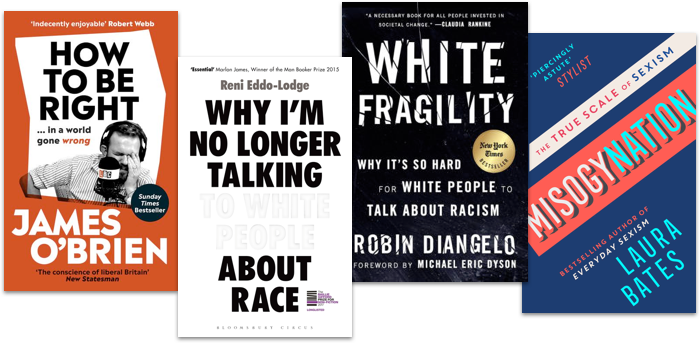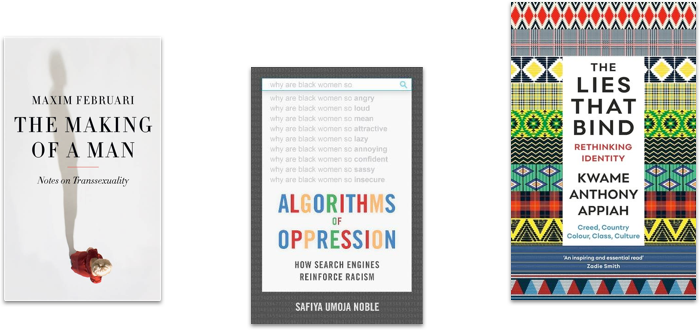The world isn’t as equal as it may seem to people who are white, heterosexual and able-bodied. This is a reading list about the inequality that they experience a lot less of. It has books about the everyday experiences of people who are underprivileged, what identity means, how racism and sexism manifest themselves and what we can do about that.
A quick disclaimer: I’m not an expert in any of these subjects, just an interested reader. This selection is by no means exhaustive, but I hope it is helpful to others.
Goldfish in bowls don’t know what water looks like, because they’re in water. That they cannot leave their bowl is a fact of their lives. The thing is… people sometimes have the same problem. When they look at society, they don’t always see all structures that exist within it. Structures like racism and sexism, for instance.
The problem that is a common theme throughout all books in this list: people who aren’t affected by bad structures, often have a wildly unrealistic idea of what they mean and how common they are. Unlike goldfish though, those people have it relatively easy to peek outside of their bubble. Listening to or reading about what people with different perspectives experience is a good habit, and what I would encourage anyone with privilege to do.
(If, reading this, you find yourself thinking “but I’m not privileged”, but you are white, male and/or heterosexual, you most likely are. Sorry.)
When you’re better aware of inequality, you’re better equipped to speak up against it. Why do I post this on my mostly tech blog? Well, if a majority of tech workers is unaware of inequality and creates technology, we risk ending up with tech that reinforces inequality. That’s bad.

Sexism is everywhere and always
Laura Bates started the Everyday Sexism project, which collects experiences from women around the world. Misogynation is a collection of her essays about sexism, many of which draw from the experiences she collected as well as solid statistics. She answers a wide range of questions people may have about sexism, and provides excellent analysis of the phenomenon in the workplace, on our streets, at home, in healthcare, in politics and in education. I admire how she combines serious and humorous. Many feminists, Bates explains, get attacked for being ‘oversensitive’ and ‘too negative’, but this kind of response ’normalises and engrains the treatment of women as second class citizens, opening the door for everything else’. Yes. Providing an enormous range of examples, Bates shows that gender inequality is very real, often pretty ridiculous and that we should and can fight it successfully.
Misogynation by Laura Bates (for some of the essays, see also: Laura Bates on sexism in The Guardian)
Racism is a system
Teaching workshops about racism in workplaces around the world, Robin DiAngelo noticed certain patterns in the attitudes of white people when confronted with racism and their part in it (everone has a part in it). They get defensive, angry and upset. She calls this white fragility: the phenomenon of white people unable to deal their racial stress. It’s painful to read about this, especially when compared to the actual problem: the experiences of people who are affected by racism itself.
Racism is not a badly intended person being racist to another per se, it is the system, DiAngelo explains. It is our society in which wealth is not equally distributed between people from different races, and in which prejudice is concealed in euphemisms like “bad neighbourhood”. That system is shaped best for white people, therefore it you are white you benefit, whether you like (or want) it or not. DiAngelo explains it much better than I can, so I would really urge you to pick it up, and/or read Alice Bartlett’s notes about White Fragility, which inspired me to read it.
White fragility: why it’s so hard for white people to talk about racism by Robin DiAngelo
Blame the liars, not the lied to
James O’Brien is a radio presenter who talks to people phoning in from all across the UK. He found that a lot of his callers have been lead to believe falsehoods by cheap journalists that prioritise clicks and paper sales above truthseeking. His book How to be right in a world gone wrong is fundamentally about challenging their bogus arguments. This takes patience and confidence, neither of which O’Brien lacks in. If we don’t share them, we owe it to ourselves to challenge beliefs, myths and lies about subjects like LGBT rights, islam and Brexit.
Blame the liars, not the lied to, is the lesson in this book: O’Brien blames the media more than individuals who rely on them. If you can stand it that O’Brien is sometimes a bit full of himself —I think he does sufficient self-reflection, but that may be me being a non-native speaker of English— this is a very entertaining read. It may help in convincing less enlightened family, friends or acquaintances.
How to be right in a world gone wrong, by James O’Brien
A British perspective on race
In Why I’m no longer talk to white people about race, Reni Eddo-Lodge confronts us with a comprehensive account of the history of (British) racism and slavery, and describes heartbreaking accounts of racism in cities like Bristol. The reason that this is important, she explains, is that too many (white) people think there is no racism problem, which is largely because history of racism isn’t taught in most British schools and people don’t do enough self-study. If the title puts you off, definitely read it. The problem of talking to white people about race, Eddo-Lodge explains, is that they tend to not accept racism exist and make it about themselves instead. That wastes the time of people who want to fight racism, because they now need to spend it on arguments irrelevant to the actual issue. Eddo-Lodge kindly takes the time to articulate why there’s no such thing as reverse racism (true racism requires power) and what’s wrong with being colour blind (‘I don’t care which colour people are’ can easily be an attitude of denying racism, which only works if it doesn’t affect you, i.e. you have the privilege to be white).
Like DiAngelo, Eddo-Lodge explains the fight against racism isn’t one against specific persons, i.e. nobody should feel personally threatened. It is about racism as a structure that has devastating consequences for people of colour, including lower grades, less benefit of the doubt, lower pay and less representation in the media.
Why I’m no longer talking to white people about race by Reni Eddo-Lodge (see also: Eddo-Lodge’s original blog post)
Racist search engines and algorithms
When a friend told Safiya Umoja Noble to do an online search for ‘black girls’, she was shocked to see what other suggested terms came up, and how that compared to searching for, say, ‘white girls’. It is excruciating. In her book Algorithns of oppression, Safiya Umoja Noble shows numerous shocking examples of how search engines contribute to more racism. She seems to put the blame on companies like Google for capitalising on racism, but with Ockham’s razor in mind I feel that could be unrelated, wouldn’t anyone who tries to index the web, also index the racism on it? But that’s not the point: when the first few pages of many search results in the largest search engine reinforce racial bias, a lot of people’s online information gets racially biased. Search engines could do something about this problem and have both the technical possibilities and moral obligation. Especially because the problem is likely to be much bigger when applied to other algorithms. Racial bias in systems that make decisions for the police for example, for instance, see also Inspecting algorithms for bias in MIT Technology Review and When algorithms discriminate in The New York Times. The author’s point is solid, but I wasn’t a big fan of the argumentation or writing style.
Algorithms of oppression: how search engines reinforce racism, by Safiya Umoja Noble (see also: Safiya Umoja Noble’s TED talk)

Making of a man
Trans people get asked odd questions, philosopher/writer Maxim Februari explains in De maakbare man (in Dutch, translations available), so he decided to write this short book to answer some of them. While he’s at it, he also critiques various legal and administrative burdens trans people face, and how our world is shaped by specific norms when it comes to sex and gender. Februari’s first person account is a great introduction to transsexuality. Interesting notes on the absolute inappropriateness of certain questions, the difference between sex and gender and what some of his environment’s responses were to Februari’s transition.
De maakbare man: notities over transseksualiteit by Maxim Februari (Dutch, available in English as Making of a man)
Are identities a lie?
People feel part of their identity, behave according to it and are treated in specific ways because of it. Yet, as the Ghanese-British philosopher Kwame Appiah shows in The lies that bind, reality is more complex than identities based on gender, class, creed (religion), colour, country and culture suggest. They bind people together, but they are also made up. In his very eloquent book, Appiah shows that none of these concepts refer really to one thing: there’s no such thing as having an English, gay or Muslim identity, because all three can vary wildly depending on time and place. He can know it, as someone who has many different identities. While many of the books in this list talk in terms of identity, this one provides excellent and thought-provoking analysis of what that means.
The lies that bind by Kwame Anthony Appiah (see also: Appiah’s Reed lectures about the same subject, also available as a podcast)
Comments, likes & shares
No webmentions about this post yet! (Or I've broken my implementation)